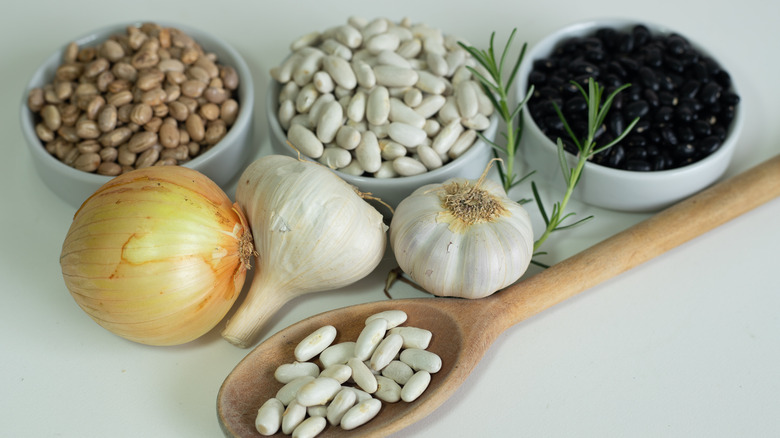The Reason You Feel Bloated All The Time
You've been working out like a fiend, watched every bit of food that you've eaten, and skipped treats, all in the name of getting into your favorite outfit. It used to fit like a glove, but now... even after you've skipped meals, you feel full, and what is with that pooch?
"Bloating is normal and it is part of our digestive process," Laura Manning, a New York-based registered dietician tells Woman's Day. As it turns out, when and what we eat has a lot to do with how and why bloating happens.
It may seem counterintuitive, but one reason for bloating may have to do with skipping meals. Manning says that if you skip meals (like breakfast) and choose to live on coffee or tea until later in the day, your stomach will be looking for something to digest — and if doesn't find anything, it will create gas. Skipping meals may also lead to gorging, or chowing down on more than your stomach can handle, which can also lead to a protruding belly).
Specific foods can cause bloating
You might also need to look at your diet to see if there is a preference for foods that can trigger excessive gas production. "We all have an increased amount of gas in the body after eating them, but some of us react to them more severely than others," gastroenterologist Kyle Staller tells Harvard Health. This happens to some of us when we eat food that belongs in a group called FODMAPs (or fermentable oligosaccharides, disaccharides, monosaccharides, and polyols) which can trigger bloating.
Foods that belong in this category include wheat; rye; onions; garlic; legumes like chickpeas, lentils, and beans; honey; pistachios; cashews; asparagus; and artichokes. Even milk and dairy are considered FODMAPs, because they contain lactose, which some digestive systems aren't equipped to handle.
Belly bloat can also be explained by the lack of fiber in your diet, which happens as our lifestyles force us to pass up on healthy food choices. In a 2018 study published in BMJ and reported by Woman's Day, researchers found that between 2007 and 2012, nearly 60 percent of our calories were derived from ultra-processed food and drink, which researchers defined as items which had undergone factory processing. As a result, they had no little to no recognizable food properties by the time they were ready to drink, eat, or heat. Doctors recommend you eat leafy green vegetables like kale and spinach, but if you're really not inclined, a fiber supplement will have to do.
Other reasons for a belly bloat
Iif you've addressed and eliminated most of the likely causes for a belly bloat, doctors say it could be time to get tested for medical conditions for which bloating is a symptom, such as irritable bowel syndrome, which is an inflammatory bowel disease which involves the lining of your gastrointestinal tract; celiac disease, where the immune system attacks the small intestine and is triggered by gluten found in many foods; and constipation, which is medically defined as having less than three bowel movements a week.
Doctors say if the condition is medical, you may need a bit of time before the issue is resolved, and chances are it won't be too long before you're able to get back into your favorite outfit.


